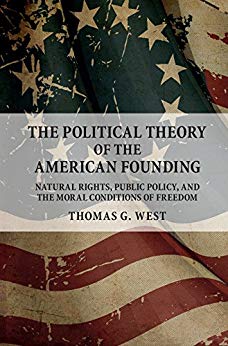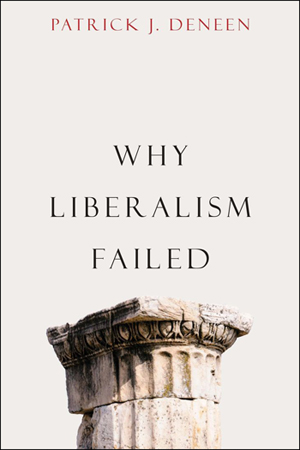 The Political Theory of the American Founding: Natural Rights, Public Policy, and the Moral Conditions of Freedom
The Political Theory of the American Founding: Natural Rights, Public Policy, and the Moral Conditions of Freedomby Thomas G. West
Publisher: Cambridge University Press (April 3, 2017). 428 pp.
Reviews and Discussion
- Founding philosophy, by Michael Anton. [Review]. The New Criterion June 2018:
West sets for himself the seemingly modest task of “explaining” the American founders’ political views—first, their political theory per se, and second, how they applied that theory to the practical task of building a new government. The qualifier is necessary because while we think we understand the founding, West shows that we—especially, all too often, those who’ve been specifically trained to explain it to others—do not.
- A Partial Vindication of Thomas West, by James Stoner. Law and Liberty 12/11/17.
- The Founders in Full, by Vincent Phillip Munoz. Claremont Review of Books 10/19/17:
By reintroducing the moral underpinnings of the founders’ natural rights republic, Thomas West has made an extraordinary contribution to our understanding of American political thought. He shows that the founders’ republicanism is a part of their liberalism; that duties and rights, properly understood, are not at odds. In doing so, The Political Theory of the American Founding not only helps us better understand America’s principles, it explains why we ought to cherish them and fight to restore them to their rightful place in our political life.
- Roundtable on The Political Theory of the American Founding: Natural Rights, Public Policy, and the Moral Conditions of Freedom by Thomas G. West. Hillsdale College. 09/19/17. [Video]
- Making Sense of the Founders: Politics, Natural Rights, and the Laws of Nature by Justin Dyer. Public Discourse> 06/09/17.
[West argues] that the founders did in fact share a “theoretically coherent understanding” of politics rooted in natural rights philosophy. Other traditions were of course present, but the founders, West insists, embraced these other traditions in their official public documents and pronouncements only to the extent that those traditions could be enlisted as allies of the natural rights philosophy. When natural rights conflicted with elements of the common law, customary practices, or religious tradition, it was the natural rights tradition that won the day. Public documents and the affairs of state—rather than sermons, commentaries, private letters, or other musings—“point to natural rights and the laws of nature as the lens through which politics is understood.”[...]
The Political Theory of the American Founding does a wonderful job of correcting some of the caricatures of the political thought of eighteenth-century Americans as amoral, areligious, individualistic, or otherwise hostile to public virtue and the moral conditions of freedom. The key, for West, is recognizing that the founders distinguished the purpose of politics (securing rights) from the purpose of life (happiness), and the founders created a society that remained open to the private pursuit of nobility, wisdom, piety, and the higher goods that were supposedly sublimated by the founders into the base pursuit of material gain.
Throughout, West leaves open the question whether the founders’ philosophy is true. I venture a preliminary answer: yes, for the most part, but only because they were buoyed by those other traditions—notably Christianity, the common law, and elements of classical theological natural law—and thereby built better than they knew.

